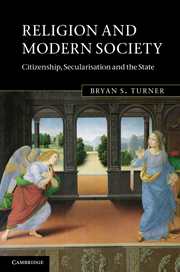Book contents
- Frontmatter
- Contents
- Acknowledgements
- Introduction: the state of the sociology of religion
- Part I Theoretical frameworks: the problem of religion in sociology
- Part II Religion, state and post-secularity
- 7 The secularisation thesis
- 8 Legal pluralism, religion and multiculturalism
- 9 Managing religions: liberal and authoritarian states
- 10 Religious speech: on ineffable communication
- 11 Spiritualities: the media, feminism and consumerism
- 12 Religion, globalisation and cosmopolitanism
- 13 Civil religion, citizenship and the business cycle
- 14 The globalisation of piety
- References
- Index
13 - Civil religion, citizenship and the business cycle
Published online by Cambridge University Press: 05 June 2012
- Frontmatter
- Contents
- Acknowledgements
- Introduction: the state of the sociology of religion
- Part I Theoretical frameworks: the problem of religion in sociology
- Part II Religion, state and post-secularity
- 7 The secularisation thesis
- 8 Legal pluralism, religion and multiculturalism
- 9 Managing religions: liberal and authoritarian states
- 10 Religious speech: on ineffable communication
- 11 Spiritualities: the media, feminism and consumerism
- 12 Religion, globalisation and cosmopolitanism
- 13 Civil religion, citizenship and the business cycle
- 14 The globalisation of piety
- References
- Index
Summary
Introduction: religious asceticism and consumerism
In this chapter I return to a familiar issue in classical sociology, namely the relationship between religion and economics. This relationship was famously explored in the Weber thesis on the ‘elective affinity’ between asceticism and rational economic activity (Weber, 2002). In this chapter I want to look at a more specific contemporary issue, namely the relationship between religion and the business cycle in the United States. In an examination of the Great Depression and the New Deal, I explore how America survived the economic crisis of the early 1930s and the public debates that surrounded that defining event in American political and economic history. I conclude the analysis with a brief overview of some of the issues that have emerged from the credit crunch of 2008–9. Franklin D. Roosevelt's economic measures clearly had some success in managing the Depression but the steep downturn in economic activity was solved eventually by America's entry into the Second World War, which created full employment by other means. This period was followed by the creation of a consumer society as yet another response to the business cycle and to the creation of modern citizenship, not by a welfare state, but by what Lizabeth Cohen (2003) called a ‘Consumers' Republic’. With the election of Ronald Reagan in 1980, there was an intensification of strategies to liberate the market from state regulations and there was consequently a ‘financialisation of America’, which has seen, in sociological terms, an increasing dominance of financial elites alongside the long-term decline of American manufacturing industry.
- Type
- Chapter
- Information
- Religion and Modern SocietyCitizenship, Secularisation and the State, pp. 255 - 270Publisher: Cambridge University PressPrint publication year: 2011



